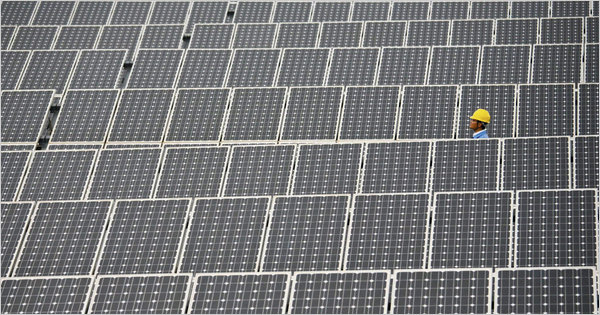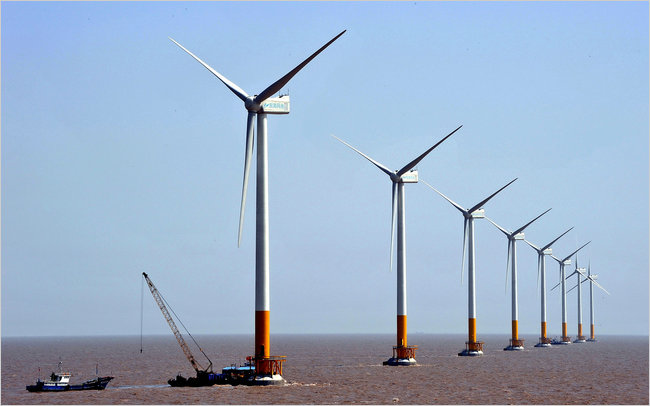Security Tops The Environment In China’s Energy Plan
KEITH BRADSHER
The New York Times

BEIJING — When President Obama called this week for a “national mission” to expand the use of clean energy and increase American energy independence, Chinese officials might have nodded knowingly.
Turbines of the Donghai Bridge Offshore Wind Farm in Shanghai. China invested almost twice as much in renewable energy last year as the United States.
BEIJING — When President Obama called this week for a “national mission” to expand the use of clean energy and increase American energy independence, Chinese officials might have nodded knowingly.
The government here is already far along in drafting energy legislation with similar goals for China, according to Chinese officials and executives.
Like the energy future that Mr. Obama briefly described in his Oval Office address on Tuesday, the Chinese proposal calls for more reliance on renewable energy and greater emphasis on energy conservation, two drafters of the legislation said.
But because this is China, there are big differences, too. In contrast to the Obama vision, the plan here preserves a central role for coal — the dirtiest fossil fuel in terms of emissions of greenhouse gases, but a resource that China has in abundance.
And while Mr. Obama voiced goals of addressing climate change and improving national security at the same time, the discussions in China have been focused almost entirely on security issues, people inside and outside the government said.
In other words, as China counts on more years of global leadership in economic growth, global warming remains a secondary concern. Secure sources of energy to fuel that growth are what matter most, whatever the implications for world energy markets and the global environment — not to mention foreign investors, who may or may not have a significant role to play in China’s energy industry under the draft law.
The proposed law, which is expected to be adopted by early next year, says that “energy supply should be where you can plant your foot on it,” meaning that as much as possible should come from within China, said Li Junfeng, a senior energy policy maker and member of the interagency committee drafting the law.
That belief has underpinned China’s rapid expansion in renewable energy, because it tends to be made in China, Mr. Li said. China has just emerged as the world’s largest manufacturer of wind turbines and solar panels, and plans to be the world’s biggest builder of nuclear power plants in the coming decade. It invested nearly twice as much as the United States last year in renewable energy.
But energy security also explains the continued reliance on coal, for which China has the world’s third-largest reserves, after the United States and Russia. Burning coal, which produces four-fifths of China’s electricity, has already turned China into the world’s largest emitter of greenhouse gases by an ever-widening margin each year since 2006.
Air pollution problems like acid rain have come up during the drafting process, but global warming has not figured prominently. China’s top global warming negotiator, Xie Zhenhua, is not even on the 21-member commission that China created in January to set energy policy.
“There is a stronger sense of energy security than climate change,” said Zou Ji, an international climate negotiator for China until his retirement last August; he is now the China country director for the World Resources Institute, an international environmental group.
The American commerce secretary, Gary Locke, said that the Obama administration also wanted to foster energy security by looking for ways to produce more clean energy in the United States, and was not just focusing on environmental issues.
“Certainly energy independence is a high priority of President Obama, and energy independence does equal energy security,” Mr. Locke said in an interview.
But China’s soaring energy demand seems to give it a greater sense of urgency on the security front.
An oil exporter as recently as the early 1990s, China passed the United States last year as the biggest customer for Saudi oil and gas exports. Within as few as five years, it will be importing a higher percentage of its oil than the United States.

That is of great concern to the Chinese government, where officials worry about the security of energy supplies from abroad. And it is why China’s military and its main security and intelligence agency are playing an increasingly visible role in energy policy making.
The deputy chairman of the joint chiefs of staff of the People’s Liberation Army is on the new, 21-member National Energy Commission, as is the minister of state security.
The bulk of China’s imported oil comes through the Strait of Malacca, between Singapore and Malaysia on one side and Indonesia on the other. China is concerned that the strait is “an area of American influence,” said the president of a state-owned energy company who helped on early drafts of the energy law before taking his current job. He insisted on anonymity because he was not authorized to discuss the draft.
China has been drafting its energy law for more than three years. The government started by setting up committees to study 978 separate topics including oil, coal, wind, biomass and solar power, the company president said.
Mr. Li said that the draft law should be ready for the National People’s Congress to approve this winter, either when the 175-member standing committee of the congress meets in December or when the full, nearly 3,000-member congress convenes in early March.
Approval by the congress is a legal formality, with all important decisions worked out in advance by ministers and their aides.
While oil demand has risen inexorably in China, domestic production has barely increased. Chinese companies have struggled to acquire oil fields elsewhere. Shut out of the most attractive operations, which are already controlled by exporting countries or Western multinationals, Chinese companies have ventured into some of the world’s most volatile countries, notably Sudan and now to some extent Iraq and Iran.
One of the last issues still unresolved in the energy legislation involves the extent to which China should continue investing in such oil fields or rely on buying oil in world markets. Mr. Li says he personally believes that China’s energy security does not improve when state-controlled oil companies buy oil fields in potentially unstable countries.
“A lot of companies say, ‘I develop oil for China,’ ” but are really out to make a profit for themselves, he said,
Somali pirates have begun preying on tankers and freighters bound for China from the Mideast. That poses a challenge for China’s navy, which is mostly designed for coastal defense.
It also helps explain why China has been looking for ways to import more of its oil through pipelines instead of by sea, said Edward Cunningham, a China energy specialist at Harvard.
Three issues are unresolved because they can be worked out only at the ministerial level, said Mr. Li, a deputy director general for energy research at the powerful National Development and Reform Commission.
One is how much foreign investment should be allowed in China’s energy industries. Foreign companies are now mostly limited to joint ventures in refining and retailing, and are barred from the ownership or production of most mineral resources.
A second issue is how much competition should be introduced into the energy industries. The domestic oil industry in particular is almost entirely run by two state-controlled companies, Sinopec and PetroChina; both are descendants of the China National Petroleum Corporation.
Finally, policy makers are still considering how best to provide clean, cost-effective energy in rural China. Incomes tend to be much lower in farming areas than in cities, and this has made the government wary of raising taxessharply on gasoline and diesel, even though steep fuel taxes might limit consumption.
Mr. Li said on Thursday that while China might be further along than the United States in drafting energy legislation, and might have a large and growing sector for the manufacture of renewable energy, it still needed American technology to improve its equipment.
“We need international cooperation,” he said. “America should be the leader.”
